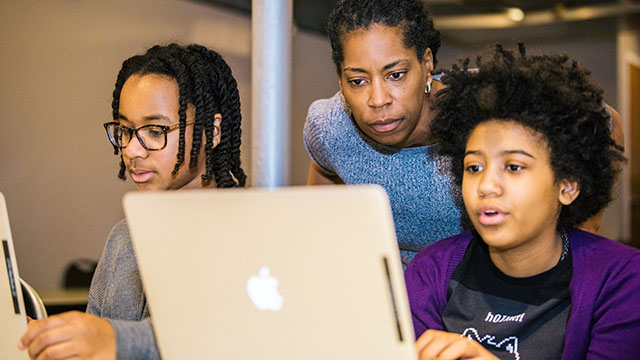Open mic nights, at-home workout videos, a photo scavenger hunt or a writing contest, guided meditation, coding challenges — there are myriad ways Chicago youth and families can learn and grow together through MyCHI. My Future., even as communities continue to limit personal contact in response to the COVID-19 pandemic.
Northwestern University is celebrating the launch of a revolutionary new initiative by the City of Chicago to connect youth to hundreds of activities in a digital space where they can interact with the friends and mentors.
Announced at a citywide virtual youth summit over Memorial Day weekend by Mayor Lori Lightfoot and First Lady Amy Eshleman, MyChi. My Future. (MCMF) brings more than 200 community organizations together on a platform designed by Northwestern learning sciences expert Nichole Pinkard.
“Every young person in Chicago deserves to explore their passions in youth-centered, out-of-school experiences,” said Mayor Lightfoot. “Access and participation in Chicago’s diverse out-of-school opportunity ecosystem must be equitable, resulting in all young people leveraging community assets and the city’s resources to build positive futures for themselves and their communities.”
Created long before the emergence of COVID-19, MCMF will serve as a solution for scores of community organizations and nonprofits working to support the young people they serve in the wake of the pandemic.
Related story: SESP creates open-access learning resources to keep communities engaged through COVID-19 pandemic
Northwestern University’s Office of Community Education Partnerships (OCEP) in the School of Education and Social Policy has been an integral partner in the initiative, creating the infrastructure for MCMF by designing a versatile platform for in-school, out-of-school and online learning. More than a search tool, the platform is an essential part of an educational ecosystem.
"Mayor Lightfoot has made Chicago a model for solutions to urban challenges around the world and become a national leader with decisive action to protect her city and its citizens. It is no surprise that she and First Lady Amy Eshleman are breaking down barriers to equity in education, even as the pandemic exacerbates longstanding disparities," Northwestern University President Morton Schapiro said. "We are honored to be part of this unprecedented collaboration and to serve Chicago's youth during the crisis and beyond.”
MCMF is the product of a partnership between the City of Chicago, Chicago Public Schools, DePaul University and Northwestern University. Northwestern has provided almost $1 million in financial support to build out the platform infrastructure.
Every young person in Chicago deserves to explore their passions in youth-centered, out-of-school experiences.”
“MCMF shows how laying the groundwork over time and building significant partnerships can pay off during a time of crisis — we are helping Chicago’s youth connect to important, much needed programming,” said Pinkard, a professor and OCEP director. “To build learning ecosystems, you build trust and connections over time.”
Pinkard created the infrastructure for My CHI. My Future., along with a number of other programs aimed at improving access and equity, by designing a platform called L3, which stands for learning (1) in school, (2) out-of-school and (3) online. More than a search tool, L3 helps young people track their learning. Each program they attend, skill they master, app they conquer and project they complete via L3 is part of their learning profile.
The University recently launched a version of the same platform, named STEAMville. An open- access platform, it focuses on science, technology, engineering, and the arts and math (STEAM). An existing program, STEAMbassadors: Community STEAM Mentorship Program, trains City Colleges of Chicago students to support online and face-to-face STEAM learning for youth.
Similarly, Northwestern OCEP provides the technical infrastructure for local efforts in San Antonio and Dallas, connecting families to relevant youth programs, giving providers a set of tools to enhance their work with youth, and allowing cities to have access to and act on the data that assures they have equitable local learning ecosystems.


